You ever have one of those days where your brain feels like a messy attic? Like, you know you should focus, but no matter what you do, the mental fog just won’t lift? I’ve been there more times than I’d like to admit. Over the years, though, I’ve found a few little tricks that actually help clear my head. And no, I’m not talking about the usual “drink water and meditate” advice (though, let’s be real, those work too). These are random little strategies I’ve picked up along the way—mostly by trying things out, messing up, and getting a bit curious about what works.
Some might resonate, some might not—but that’s the beauty of experimenting. Let’s dive in.
Table of Contents
Why Clear Thinking Actually Matters
Alright, let’s break this down. Clarity of thought isn’t just some feel-good idea people throw around—it’s legit life-changing. Picture this: you’re in a brand-new city, no GPS, no map, and absolutely no clue where you’re headed. What happens? You’re taking random turns, getting lost, and probably ending up right back where you started. That’s exactly what life feels like when your brain’s a hot mess—scattered, overwhelmed, and full of “What the heck am I even doing?” moments.
Clarity is your map. It gives you direction, helps you figure out what actually matters, and keeps you moving forward instead of spinning your wheels. Without it, you’re just reacting to whatever life throws at you—playing defense. But with it? You’re in control, steering the wheel toward where you actually want to go.
And it’s not just about cranking out more work or being productive. Clarity brings peace. When you know what you’re doing and why, there’s way less stress and second-guessing, and you walk through life with more confidence.
How Clarity Can Change Everything
Let’s talk about why this is a big deal. Imagine cleaning your glasses (or wiping that greasy smudge off your phone screen). All of a sudden, everything looks sharper, brighter, and way easier to handle. That’s what clarity does for your life—it clears the fog.
First off, it makes decision-making a breeze. Whether it’s a big career move, deciding which friend to spend your weekend with, or even just figuring out what’s for dinner, clear thinking helps you cut through the noise. No more endless “Should I, shouldn’t I?” debates in your head—you just know.
It also saves you so much mental energy. When your brain isn’t tied up in knots, you’ve got more space for creative ideas, solving problems, or just living in the moment. You stop sweating over tiny, pointless things and focus on what actually makes you happy. It’s like decluttering that junk drawer—you toss out the nonsense and rediscover the good stuff you forgot was even there.
And don’t even get me started on relationships. When you’re clear about what you want and what matters to you, you communicate better. You stop putting up with toxic people or draining situations, and instead, you make space for the people and things that actually lift you up. It’s like flipping a switch—you suddenly start attracting what you deserve.
At the end of the day, clarity doesn’t just make things easier—it makes them better. It’s the magic ingredient for living a life that feels purposeful and calm. And let’s be real, who doesn’t want more of that?
Hacks That Can Help Achieve Clarity of Thought
Ever feel like your brain’s a cluttered junk drawer? One minute you’re trying to focus, and the next, your thoughts are playing tag, darting off in every direction. Clarity can feel like a myth when you’ve got distractions flying at you non-stop. But good news—there are simple, no-fuss tricks to quiet the noise, get your thoughts in line, and actually feel on top of things. Plus, science backs up these hacks, so you know they work. Let’s dive in.
Hack 1: Brain Dumps—Because Your Brain’s Not a Filing Cabinet
You know that feeling when you’ve got a hundred random things bouncing around in your head? It’s like trying to juggle while someone keeps tossing more balls at you. A brain dump fixes that. Just grab a notebook, your phone, or even a napkin, and dump everything out—tasks, worries, that song stuck in your head. No filter, no judgment, just let it flow.

Here’s the science-y bit: researchers in Psychological Science found that writing down what’s bothering you can lower stress and help you focus. It’s like cleaning out your mental closet—you get rid of the junk so you can actually see what matters. Pro tip? Make it a daily habit, like brushing your teeth but for your brain.
Hack 2: The Five-Why Rule—Ask Questions Like a Nosy Kid
Ever noticed how kids ask “Why?” a million times until you’re explaining how the universe works? Turns out, they’re onto something. The Five-Why Rule is a method for digging into the root cause of any issue.
Here’s how it works:
- Start with your problem.
- Ask “Why?”
- Answer it, then ask “Why?” again about that answer.
- Repeat five times.
Example:
- “Why am I so stressed?”
- “Because I have too much work.”
- “Why do I have too much work?”
- “Because I never say no to extra tasks.”
- “Why don’t I say no?”
By the fifth “why,” you’ll uncover the real issue—and suddenly things feel way clearer. It’s like peeling layers off an onion, but with less crying.
Hack 3: The Mental Parking Lot—Park It and Keep Moving
You know when you’re in the middle of something, and a random thought butts in, like, “Did I lock the door?” or “What’s for dinner?” Instead of letting it derail your focus, park it.
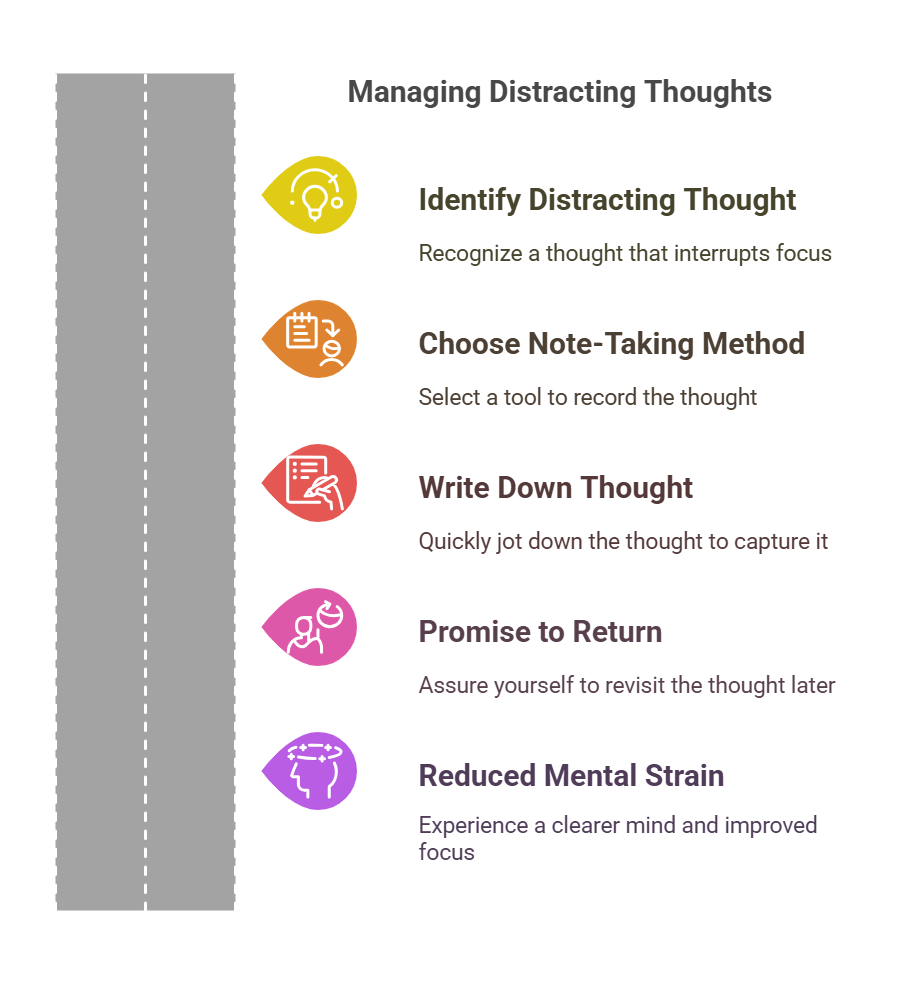
Keep a sticky note, a notes app, or whatever’s handy, and jot the thought down. Promise your brain you’ll circle back to it later. Studies have shown this simple trick reduces mental strain by reassuring your mind that nothing important is being forgotten. It’s like giving those nagging thoughts a time-out so you can actually get stuff done.
Hack 4: Mind Maps—Untangle Your Spaghetti Brain
When your thoughts feel all over the place, sometimes you just need to see them laid out. Grab a blank page, write your main thought in the middle, and branch out with related ideas. Boom—instant clarity.

This isn’t just a fun doodling exercise. Research in the Journal of Cognitive Neuroscience shows that visuals like flowcharts and mind maps help you process and remember information better. So instead of letting your brain spiral, map it out and watch the chaos turn into something manageable.
Hack 5: The One-Minute Rule—Knock Out the Little Stuff
If a task takes less than a minute to do, just do it right away. File that paper, reply to that email, put the shoes back in the closet. Little wins like these add up, clearing both your space and your brain.
This tip comes from productivity guru Gretchen Rubin, and it works like magic. It’s like picking up small crumbs so you can focus on baking the cake (aka the big stuff).
Hack 6: Compare It Side by Side—Stop Overthinking
When you’re stuck making a decision, keep it simple: pick a few key things to compare. Salary, free time, commute—whatever matters most.
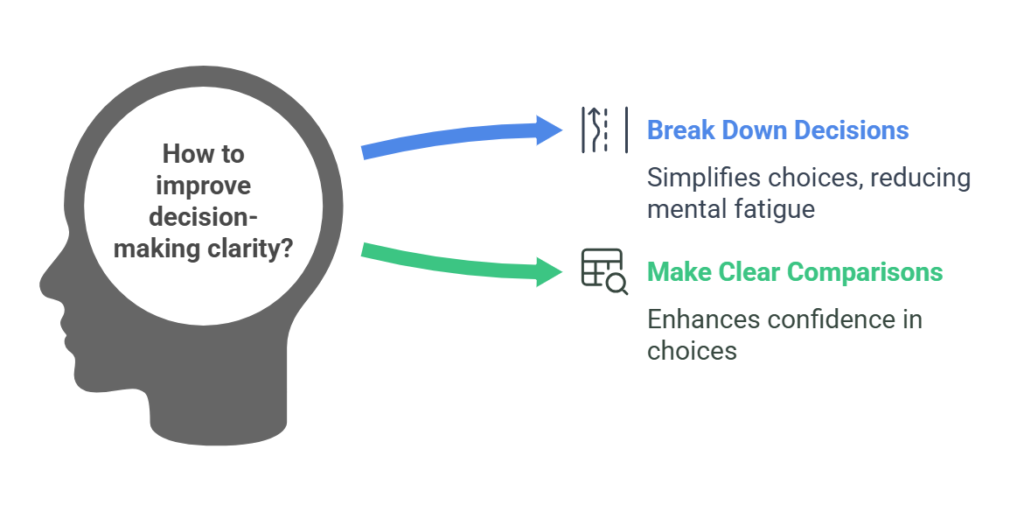
Studies show that breaking down decisions into smaller, clear comparisons helps reduce mental fatigue and boosts confidence in your choices. Think of it as clearing the fog off your mental windshield so you can finally see the road ahead.
Hack 7: The 3-2-1 Rule—Simplify Your Day
When your to-do list feels like Mount Everest, try this trick:
- Pick 3 things you absolutely have to finish today.
- Choose 2 things that can wait until tomorrow.
- Let 1 thing go entirely (because not everything’s life or death).
This hack helps you focus on what actually matters without drowning in guilt over the rest. It’s about progress, not perfection.
Hack 8: Ask Yourself Better Questions
Instead of spiraling into stress, pause and ask yourself:
- “What’s really the issue here?”
- “What’s the worst that could happen?”
- “What’s one tiny step I can take right now?”
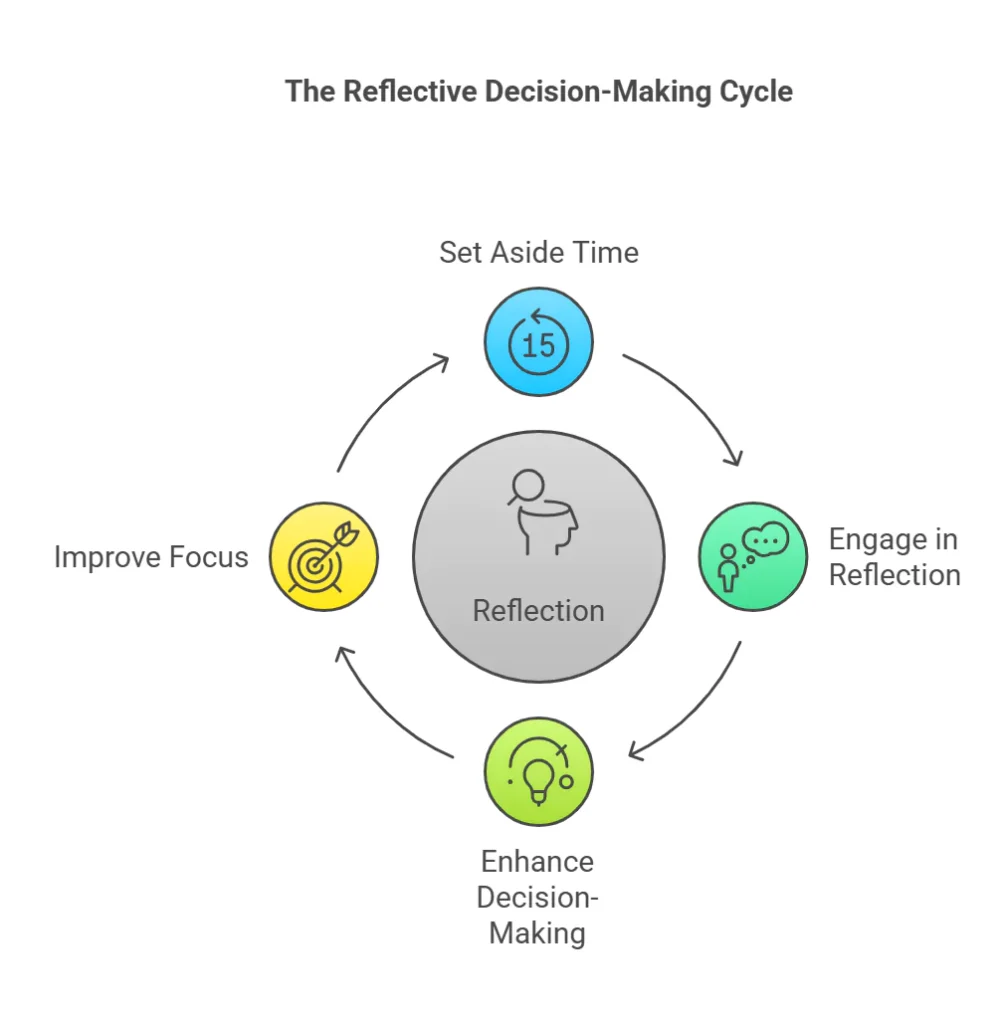
Writing out your answers can help, too. According to a Harvard Business Review study, spending just 15 minutes a day reflecting can improve decision-making and focus. So go ahead, play therapist with yourself—it works.
Hack 9: Unplug—Give Your Brain a Break
Phones are like clarity kryptonite. Between endless notifications and doomscrolling, it’s no wonder your brain feels fried.

Try a mini digital detox. Even an hour without screens can help. Research from the Journal of Social Psychology found that unplugging improves focus and reduces stress. Think of it as putting your brain on “Do Not Disturb” mode so it can recharge.
Hack 10: The Pomodoro Method—Focus in Sprints
This one’s a classic because it works:
- Pick one task and work on it for 25 minutes.
- Take a 5-minute break.
- Repeat four times, then take a longer break.
It’s all about working smarter, not harder. Studies show this method keeps your brain sharp and helps you power through tasks without burning out. Plus, those breaks? Total game-changer.
Hack 11: Sleep on It—Literally
Sometimes the best way to solve a problem is to stop thinking about it. Sleep does wonders for your brain. A study in Nature Communications found that REM sleep helps connect unrelated ideas, leading to those “Aha!” moments. So if you’re stuck, call it a day. Your brain will keep working while you snooze.
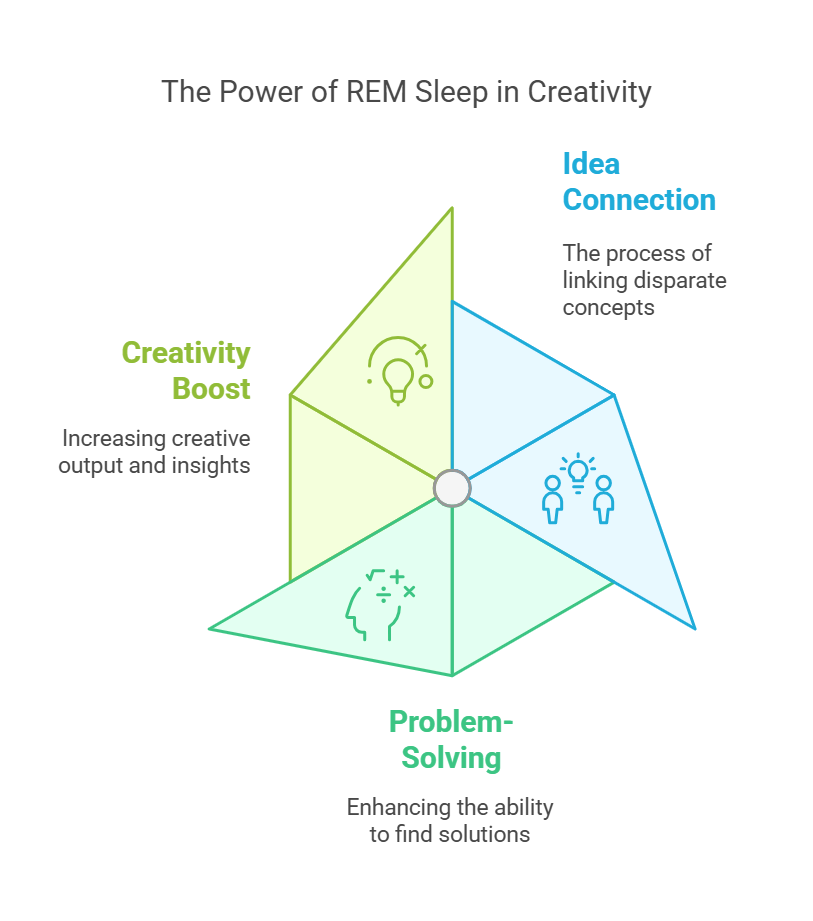
Hack 12: Talk It Out—Fresh Eyes, Fresh Ideas
Ever notice how explaining your problem to someone else makes it easier to solve? That’s because they bring a fresh perspective—or just saying it out loud helps you see it differently. Either way, don’t underestimate the power of a good chat with a friend or mentor.
Hack 13: Move Your Body, Clear Your Head
When your thoughts feel stuck, get moving. Go for a walk, stretch, dance around your living room—whatever works.

Research from Stanford University shows that walking can boost creative thinking by up to 60%. It’s like hitting the reset button for your brain.
Hack 14: Gratitude Reset—Shift Your Focus
When you’re overwhelmed, take two minutes to list a few things you’re grateful for. It might sound cheesy, but studies show that practicing gratitude reduces stress and improves clarity. It’s like giving your brain a quick reset.

Hack 15: The “What Matters Most?” Question
When you’re drowning in decisions or tasks, pause and ask yourself, “What matters most right now?” It’s a simple question, but it cuts straight through the noise.
A study from The University of Chicago found that focusing on your core values helps with decision-making and lowers regret. So let this be your go-to when things feel chaotic.
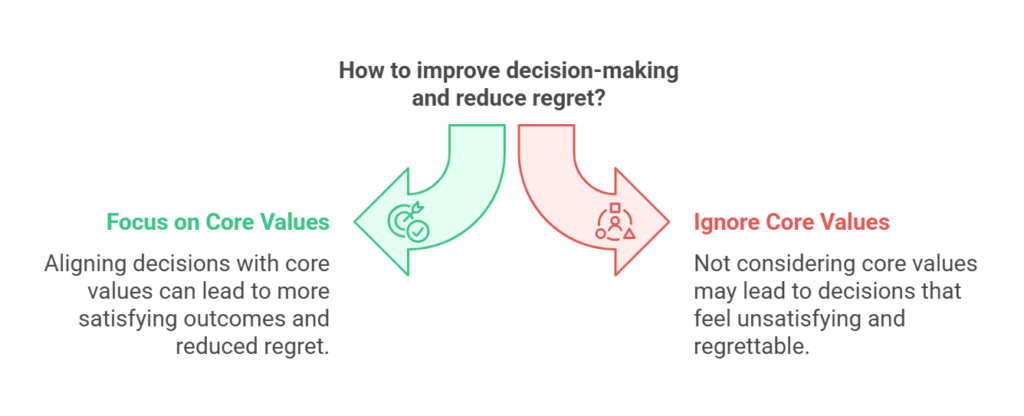
At the end of the day, clearing your mental clutter isn’t about being perfect. It’s about finding small, simple ways to quiet the noise so you can focus on what really counts. Try a few of these hacks, and see how much lighter your brain feels.
Final Thoughts
Thinking clearly isn’t some superpower only monks or geniuses have. It’s just about finding what works for you. Maybe it’s scribbling your thoughts on paper, getting some fresh air, or letting yourself be curious like a kid again. These little things can help you cut through the mess in your head and think straight.
So, give it a shot! Try one or two and see how they feel. If something doesn’t work, no big deal—just try something else. There’s always another way to figure things out.
FAQs
What’s the connection between physical health and mental clarity?
Your body and mind are totally connected. If you’re staying hydrated, eating good food, and moving your body—even just a little—it keeps your brain in top shape. Simple stuff like a walk, yoga, or even stretching gets your blood flowing and helps you focus better.ng can enhance focus.
How does sleep impact mental clarity?
Sleep is like hitting the reset button for your brain. When you sleep, your brain clears out the junk and gets ready to work again. If you’re not getting enough (we’re talking 7-8 hours), you’ll probably feel foggy and out of it.
How can technology be used to improve mental clarity?
Apps for meditation, focus playlists, or productivity tools like time-blocking apps can help reduce distractions and improve focus. Just be mindful of overusing technology—it’s best to take regular screen breaks.
Are there long-term strategies for maintaining mental clarity?
For sure! It’s all about building habits that actually stick. Try journaling, staying active, and setting some solid boundaries between work and your personal time. Cut down on distractions, find little things to be grateful for, and keep learning—it doesn’t matter what, just keep your brain engaged. It’s not about quick fixes; it’s about playing the long game and setting yourself up for the win!
What role does environment play in mental clarity?
Your surroundings matter more than you think. A clean, organized space makes it way easier to focus. Add some natural light, a few plants, or even a calming candle, and you’ve got a space that helps you think clearly.
Study & References
Here’s a combined list of all the study and article links mentioned:
- Using Brain Dumping to Manage Anxiety and “Over Thinking”
- How a Morning Brain Dump Helps You Stay Focused
- Stanford Study Finds Walking Improves Creativity
- Give Your Ideas Some Legs: The Positive Effect of Walking on Creative Thinking
- The Positive Effect of Walking on Creative Thinking
- Study: Walking Increases Creative Output By 60%
- Brain Dump: A Powerful Technique to Manage Your Mental Health
- A Ramble on Walking and Creativity
- The Power of Walking: Unleashing Brilliance and Creativity
- Neuroscientists Identify Brain Mechanism that Drives Focus
- How a Gratitude Practice Can Improve Focus and Mental Clarity
- The 3-2-1 Rule: Simplify Your Day for Better Productivity
- How Reflection Improves Decision Making
- The Pomodoro Technique: How to Work in Sprints
- Sleep’s Role in Creativity and Problem-Solving
- How Unplugging Reduces Stress and Boosts Focus







